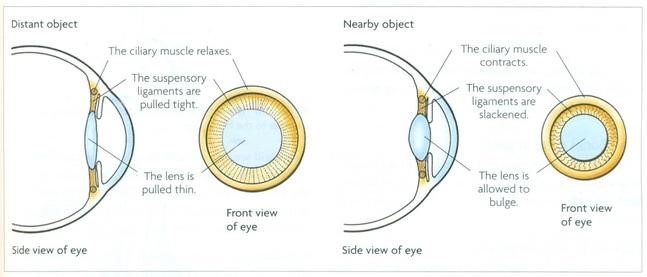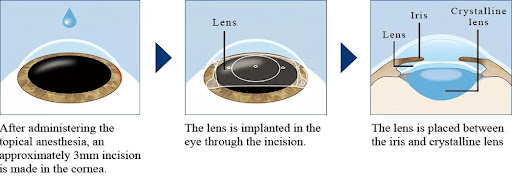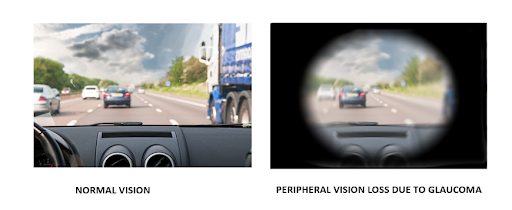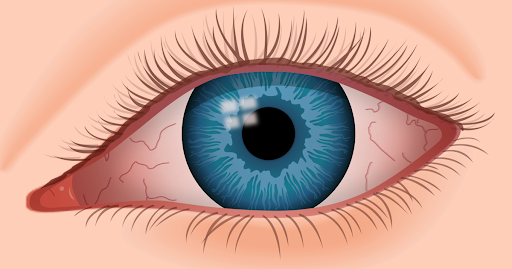Often referred to as eye-focusing disorder, accommodative dysfunction is a vision problem when the eye’s focusing system does not function properly. This condition primarily affects the ciliary muscle, which is responsible for changing the shape of the eye’s lens to accommodate varying distances.
A person with focusing difficulty may experience blurry vision, eyestrain, and fatigue that could hamper everyday activities if left untreated. Luckily, Eyeonce Eye Clinic has professional eye doctors, Dr. Paik Dong Won and Dr. Jung Sae Rom, who are specialized in providing safe, customized treatment plans for accommodative dysfunction.
Causes and Risk Factors
Understanding accommodative dysfunction’s causes and risk factors is crucial in identifying potential triggers and seeking appropriate treatment. Some of the causes include:
- Eye fatigue – Prolonged periods of doing near work like reading or working on digital devices lead to straining the ciliary muscle. Over time, this strain may result in accommodative issues.
- Age-related changes – Our eye’s lens loses some flexibility as we age, making it more challenging to focus on nearby objects, thus triggering accommodative insufficiencies.
- Refractive errors – Any existing refractive errors like myopia or hyperopia can interfere with the eye’s ability to focus correctly. People with untreated refractive errors may experience exacerbated accommodative issues.
- Neurological factors – Certain neurological conditions can disrupt eye and brain coordination, leading to difficulty adjusting focus.
- Visual stress – It is prevalent in professions that engage in visually demanding tasks without adequate breaks. Working for extended periods of close work can strain the eye muscles and exacerbate accommodative insufficiencies.
Some of the accommodative dysfunction risk factors include the following:
- Occupation and lifestyle – People working in professions that demand prolonged near work like reading, writing, sewing, and using digital devices such as laptops and computers can increase the risk of developing accommodative dysfunction. The constant strain on the eye’s focusing muscles can lead to difficulties adjusting between varying distances.
- Age – As we age, our eye’s lens naturally loses its flexibility which can contribute to accommodative dysfunction, making it harder to focus on close objects.
- Genetic predisposition – Family history affects an individual’s likelihood of having accommodative dysfunction.
- Health conditions – Certain medical conditions, such as diabetes and autoimmune disorders, can impact the eye’s proper focusing ability. Individuals with these conditions risk developing accommodative dysfunction if left untreated.
- Unmanaged refractive errors – Untreated myopia and hyperopia can further cause strain on the eye’s focusing muscles, resulting in accommodative dysfunction.
- Visual hygiene practices – Poor visual hygiene, such as inadequate lighting, improper screen distances, screen time, and infrequent breaks in doing near tasks, can contribute to eye strain and accommodative dysfunction.
- Incorrect eyewear prescription – Wearing incorrect or outdated eyeglasses or contact lenses can strain the eyes and lead to accommodative dysfunction.
At Eyeonce Eye Clinic, we help our patients recognize and understand these causes and risk factors to help address accommodative dysfunction adequately. Our eye care professionals will provide a comprehensive evaluation and personalized treatment plan that best suits your condition.
Symptoms
Even though accommodative dysfunction is not life-threatening, it can still significantly impact our everyday life, causing discomfort and hampering our productivity. It is crucial to recognize its symptoms which can include:
- Blurred vision, especially when looking at near objects
- Difficulty in performing near work
- Difficulty switching and focusing between far distances
- Eye fatigue
- Eyestrain
- General fatigue, especially at the end of the day
- Avoidance of visually detailed work
- Headaches over the brow or temples
- Poor reading fluency or comprehension
- Requires frequent breaks to complete work
- Holding materials too close
If you or someone experiences any of these symptoms, it is highly advisable to consult Eyeonce Eye Clinic’s ophthalmologists for a comprehensive eye exam. Early diagnosis and intervention are imperative in managing accommodative dysfunction effectively. Our eye doctors, Dr. Paik Dong Won and Dr. Jung Sae Rom will conduct various tests to assess the extent of your condition and recommend appropriate treatments that will improve your visual comfort and quality of life.
Diagnosis and Treatment
At Eyeonce, we specialize in diagnosing and treating accommodative dysfunction, which includes the following steps:
- Visual acuity test – This test assesses your ability to see clearly at various distances and helps identify potential focusing difficulties.
- Retinoscopy – Our optometrists will use a retinoscope to determine your refractive error and evaluate how well your eyes can focus on different objects.
- Accommodative amplitude test – It measures the flexibility of your eye’s lens and its ability to adjust focus when transitioning between near and far objects.
- Near point of convergence test – Our eye care professionals will examine how well your eyes can maintain alignment while focusing on a nearby object, which can indicate accommodative issues.
- Comprehensive eye health examination – Along with assessing your focusing ability, we also examine the overall health of your eyes to rule out any other underlying conditions.
Once diagnosed with accommodative dysfunction, our skilled ophthalmologists will recommend tailored treatment options based on the severity of your condition and individual needs, which may include:
- Prescription eyewear – Customized eyeglasses and contact lenses can help correct any refractive errors contributing to accommodative dysfunction.
- Vision Therapy – Our clinic offers specialized vision therapy programs to strengthen the eye muscles responsible for focusing.
- Multifocal lenses – We also provide multifocal lenses that offer clear vision at various distances, reducing the need for constant focus adjustment.
- Bifocal or progressive lenses – They combine prescriptions to address near and far vision challenges.
- Prism lenses – If misalignment of the eyes contributes to accommodative dysfunction, prism glasses can help align your eyes correctly and alleviate strain.
- Personalized recommendations – Our team will guide proper visual hygiene practices, such as taking breaks during near tasks, maintaining appropriate lighting conditions, and adopting healthy screen habits.
Eyeonce Eye Clinic is committed to providing comprehensive and personalized care to individuals experiencing accommodative dysfunction. Our experienced ophthalmologists and state-of-the-art diagnostic tools ensure accurate assessments and treatment plans. Visit Eyeonce for more information and to book your consultation.
Why choose Eyeonce Eye Clinic Gangnam for accommodative dysfunction treatment?
Utmost Patient Care
Our eye care professionals and staff ensure to give you your money’s worth. We guarantee you receive the best medication possible and assure you that you are guided and understood, making you feel comfortable and confident at every step.
Comprehensive Consultation
Eyeonce Eye Clinic offers comprehensive eye examinations to evaluate your condition and determine the best accommodative dysfunction treatment. Our ophthalmologists take their time to cater to your questions and address your concerns, ensuring you make an informed decision about our vision correction options.
Expert Eye Doctors
Our ophthalmologists, Head Director Dr. Paik Dong Won and Medical Director Dr. Jung Sae Rom, are highly knowledgeable and skilled in treating accommodative dysfunction. They always use the latest techniques and technologies to ensure optimal results.
Add Your Heading Text Here
No. Accommodative dysfunction itself does not cause permanent vision loss. However, untreated eyestrain and associated conditions may lead to complications.
For mild cases, eye exercises and vision therapy may be sufficient to improve focus. However, a comprehensive professional guidance approach is recommended for more severe cases.
Sometimes, individuals may still require glasses, especially for specific tasks or situations, even after successful vision therapy.
Conclusion
Accommodative dysfunction is a common vision problem affecting individuals of all ages. Understanding its causes, recognizing its symptoms, and seeking timely treatment are essential for optimal visual comfort and overall well-being. With the proper intervention from a trusted eye clinic such as Eyeonce, you can significantly improve your focusing ability and lead a more comfortable life. Book an appointment with us today and visit our website for more information.



